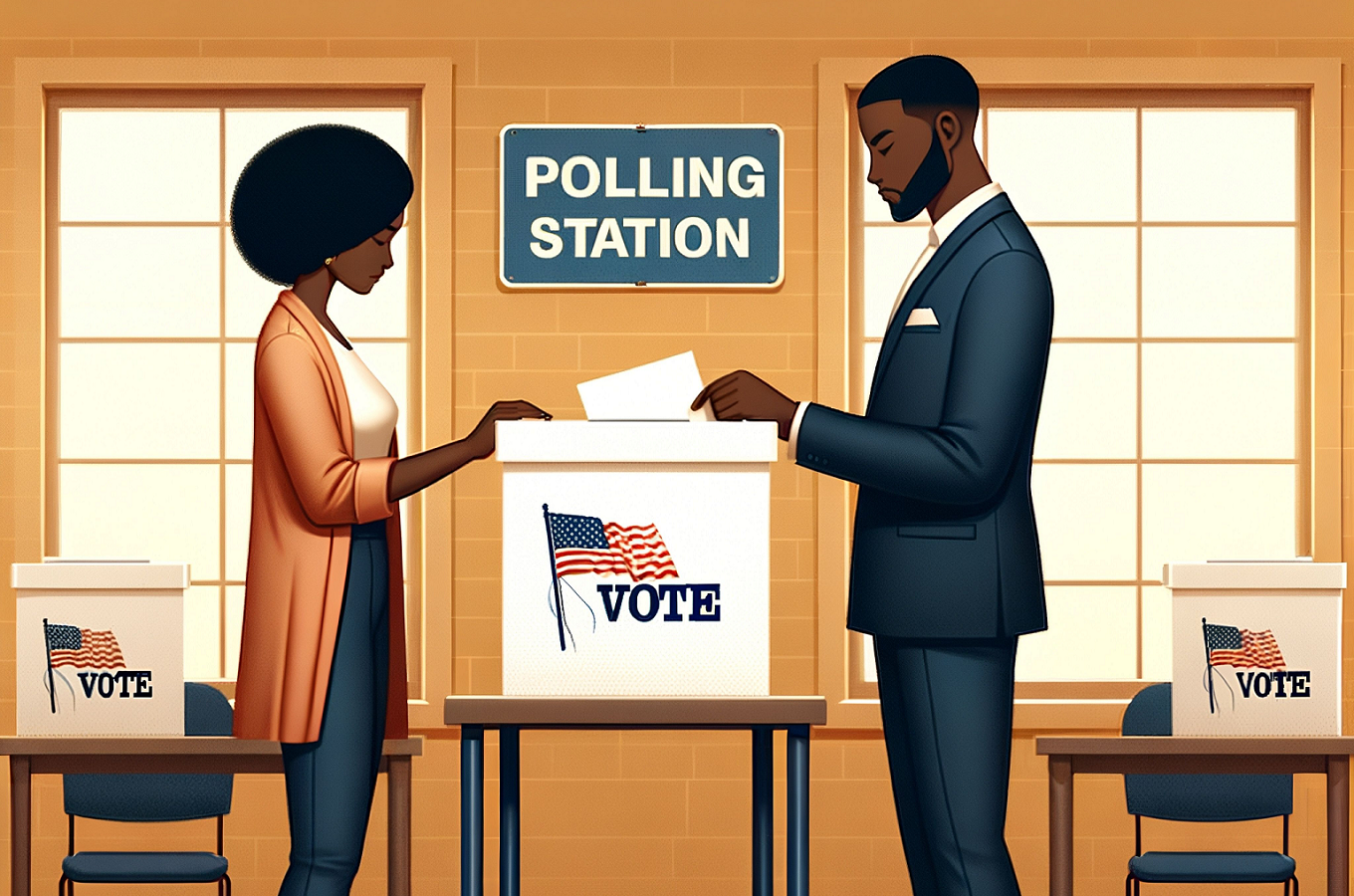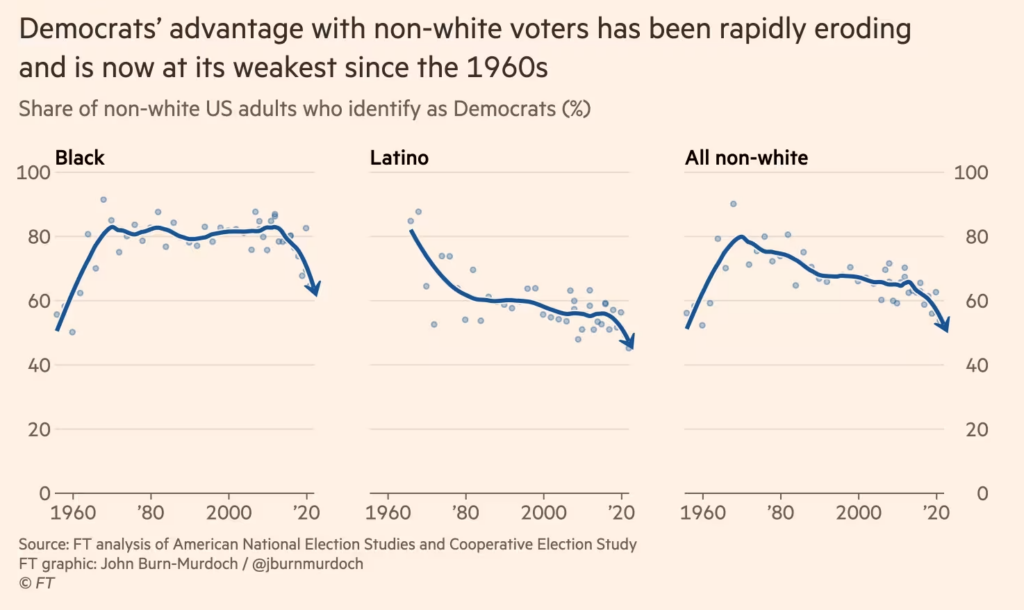Newsletter March 21, 2024
Black Men Are Rapidly Abandoning the Democratic Party, But Are Black Women?

After generations of unwavering support for the Democratic Party, black Americans appear to be reassessing their commitment to the party. John Burn-Murdoch recently wrote that “American politics is undergoing a racial realignment,” showing a significant decline in Democratic affiliation, while Nate Silver suggested that Democrats are “hemorrhaging support with voters of color.”
Recent polls certainly show a softening of black support for Democrats, a troubling development for the party. But what’s less clear is how much the decline in Democratic affiliation reflects a fundamental shift in political orientation versus a sign of general unhappiness with current political conditions and party leadership.

How Much of This is About Joe Biden?
Back in 2020, my former colleague, Rob Griffin, and I found that Biden was performing worse among black voters than Hillary Clinton. This is a consistent pattern with Biden that is not unique to black voters—he struggles to maintain the support of traditional Democratic constituencies.
The timing of this decline in Democratic identity is another reason to believe that Biden may have something to do with it. According to the ANES and CES polling data cited by Burn-Murdoch, Democratic affiliation among black Americans plunged in 2020. Gallup surveys show the drop in affiliation occurring even later, mostly in the years following Biden’s election.
Black Americans view Biden more favorably than other Americans but do not believe he has done much to help them. What’s more, the Biden campaign’s decision to focus the 2024 election on safeguarding democracy does not appear to be resonating among black voters.
A recent Reuters/Ipsos poll found that black voters were far less concerned than other left-leaning groups about the threat Trump poses to the country’s political system. Reuters reporter Jason Lange writes:
Biden’s Black supporters, who make up about a fifth of his political base, were considerably less likely than his white backers to respond in the poll that they were voting to stop Trump, 37% to 65%. . . . Black Democrats were also less likely than white Democrats to say they were worried about a presidential candidate stealing an election or partisan state legislatures overturning its results.
Black voters were critical to Biden winning the Democratic nomination in 2020, but he has struggled to connect with younger black Americans as president. Only about half (51 percent) of black Americans under the age of 50 have a favorable view of Biden, compared to 82 percent of black Americans over 50.
Black Women Still Support the Democratic Party
If we’re witnessing a once-in-a-generation racial realignment, it seems that black women are not following the same script. There has been some erosion of Democratic identity generally, but it’s been relatively modest. In 2023, 72 percent of black women identified as Democrats or leaned towards the party, compared to 58 percent of black men. It’s men who have experienced the most dramatic decline. In 2014, roughly eight in 10 black women (82 percent) and black men (78 percent) identified as Democrats. Today, black men are 20 points less Democratic than they were during Obama’s second term.
In The Atlantic, Leah Wright Rigueur suggests that one reason black women have remained loyal to the Democratic Party is their belief that their lives are inextricably intertwined with those of other black women, a concept known as shared or linked fate. She writes:
For Black women, voting is an act of collectivism: They vote as an impenetrable bloc, with slight variations due to class, socioeconomic background, and geographic region. The [2020] AP VoteCast survey estimates that 93 percent of Black women supported the Biden-Harris ticket, a gendered distinction that far exceeds the parameters of any one presidential election cycle (they also voted in fewer numbers than Black men in the Nixon and Reagan contests: 14 percent, then 9 percent and 7 percent, respectively).
Therefore, Wright Rigueur argues:
When Black women view a policy as harmful or racist to the community, they’ll reject that initiative, regardless of the personal advantages it could yield. A clear-eyed example of this is the way that a higher percentage of Black women—including those who are wealthy and upper-middle class—were unmoved by Trump’s economic initiatives aimed at Black communities.
It’s also possible that black women are more committed to the Democratic Party because of their strong aversion to Donald Trump. Eighty-one percent of black women have an unfavorable view of the former president, including 69 percent who have a “very unfavorable” opinion of him.
At this point, there’s no doubt that the Democratic Party is facing real challenges with some of its core supporters. I’m not yet convinced that we’re witnessing a fundamental realignment in black voting behavior. Few black Americans identify as Republican, and views of the GOP among black voters remain overwhelmingly negative. At the same time, even modest erosion of Democratic support among black voters could have catastrophic consequences for Biden and other Democratic candidates. Axios found that, while voter turnout among women surged between 2016 and 2020, one group experienced a small but notable decline: black women.








